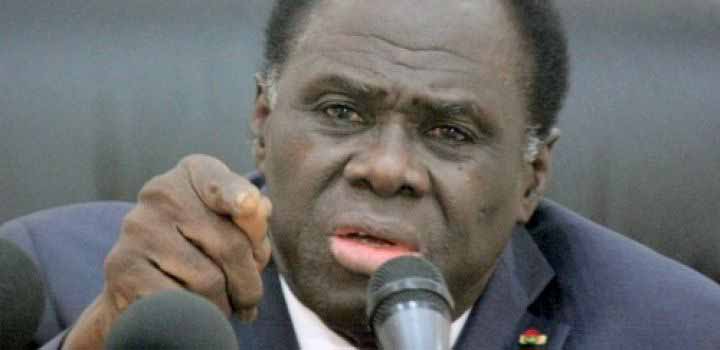Will the transitional government of Burkina forget the farmers?
My best wishes for 2015 to all of you, not forgetting the farmers of the world in general and those of Burkina Faso in particular.
Yesterday I listened to the President of the provisional government, Mr Michel Kafando, presenting his good wishes for the new year at the 8 p.m. news on the RTB (Burkina television and radio broadcasting) to the people of Burkina. In this first New Year’s message he did not forget to especially address the women and the young who played a decisive part in the uprising of October 30 and 31. In an initial message the President can obviously not cover everything. He did however ensure us that the National Transition Council (CNT – Conseil National de Transition) is now fully operational. We only hope that we can believe him. However, I very much fear that again the farmers will be left out and once more remain the “magnificent forgotten”.
 Indeed this morning on the website Lefaso.netI find an article on the ECOWAS Common External Tariff, “The economic operators of Burkina are delving into its contents 48 hours before its entry into force.” The author takes care to quote the president of the ECOWAS Commission, Mr Kadré Désiré Ouédraogo. He did not shy from stating that the new CET protects our agriculture.
Indeed this morning on the website Lefaso.netI find an article on the ECOWAS Common External Tariff, “The economic operators of Burkina are delving into its contents 48 hours before its entry into force.” The author takes care to quote the president of the ECOWAS Commission, Mr Kadré Désiré Ouédraogo. He did not shy from stating that the new CET protects our agriculture.
Thomas Sankara would never had said such a thing ! Moreover he would never have let Burkina Faso accept the new CET, which in no way is a protection for our agriculture !
How can Mr Ouédraogo declare that the new tariff protects our agriculture ?
It hardly protects it.. >Why did the speaker not mention (or why did the journalist not note) that the CET consists of more than 5000 tariff lines and that only 130 of them are within the 35% band, that is to say a mere 2 or 3% of all tariff lines !
In general, as regards agriculture, hardly anything has changed ! Milk powder is still taxed at only 5%, while the EU is preparing to abandon its milk quota and thus pour out its surplus production on West Africa.
Rice imports are still taxed only 10% here, whilst at the same time Thailand is bogged down with a surplus stock of 15 million tons of rice (an all time high) and sees no other solution but to spill out its surplus on the world market at cut throat prices.
The problem is that world market prices for food and farm products are highly volatile. Safeguarding domestic agriculture by percentage taxes is not the answer.
For African sensitive products, some tariff lines (rice, milk powder and dairy products) should be replaced by a two pronged mechanism of fixed entry price + variable levy.
An example will show how such a mechanism works. Let us look at rice: the ECOWAS can set an entry price of 400 000 CFA francs a ton. If prime quality Thai rice enters our ports at a price of 450 000 Francs, no levy will be due. But if Thailand wants to send us old rice (that might have been stored for 10 years) at 300 000 francs a ton, there will be a tax of 100 000 Francs. European countries were able to strongly promote their agriculture in this way. Under such a system rice farmers in Burkina would be able to make a living in dignity from their work. And the government may invest in developing the country’s rice plains...
This is possible. Europe did this after the war, when it could not produce enough to feed its people. Therefore negotiations to this effect should be opened with the ECOWAS as a start and then with the WTO. It can be done. A bit of political will would suffice. It is our hope that the provisional Government of Burkina has the clout to do so and that it will share its determination with other West African countries.
No indeed, the new CET does not help the farmers. Will the provisional government forget agriculture, or will it see to it that the political renewal of this country carries benefits for all, including the rural population, which represents at least 80% ? To leave the farmers out would lead the country to failure, once again.
One final, more personal word: I have now lived in the third largest city of the country, Koudougou, for 17 years. I have seen the city develp, the number of colleges and high schools increase and the university of Koudougou expand. It now has over 12 000 students.
But I have not seen poverty recede.Numbers of destitute women come to our doorstep. Often they are widowed or abandoned by their husbands. They are unable to feed their children adequately and send them to school. To help them we offer small amounts in loans, mostly 75 €. And sometimes, for them to set up a small business of their own, as hairdressers and seamstresses, we donate an additional 100 or 200 €, so that reimbursements will not be too heavy a burden..
For others we make a contribution to tuition fees, at college or high school for a student (most of the time a girls, since they are the hardest hit when the family is poor).
My thanks to all those of you who wish to contribute to such solidarity action.
Happy New Year 2015 to all
Koudougou, January 1st 2015
Maurice Oudet
Director and Editor SEDELAN









